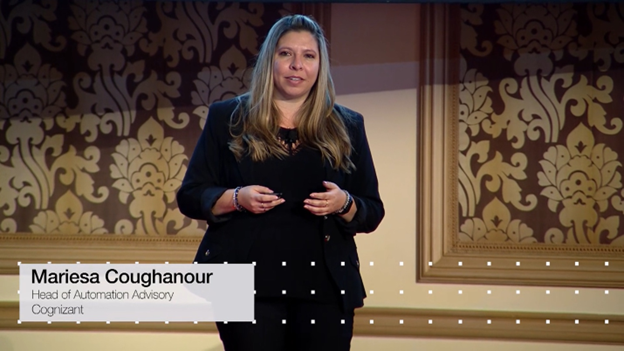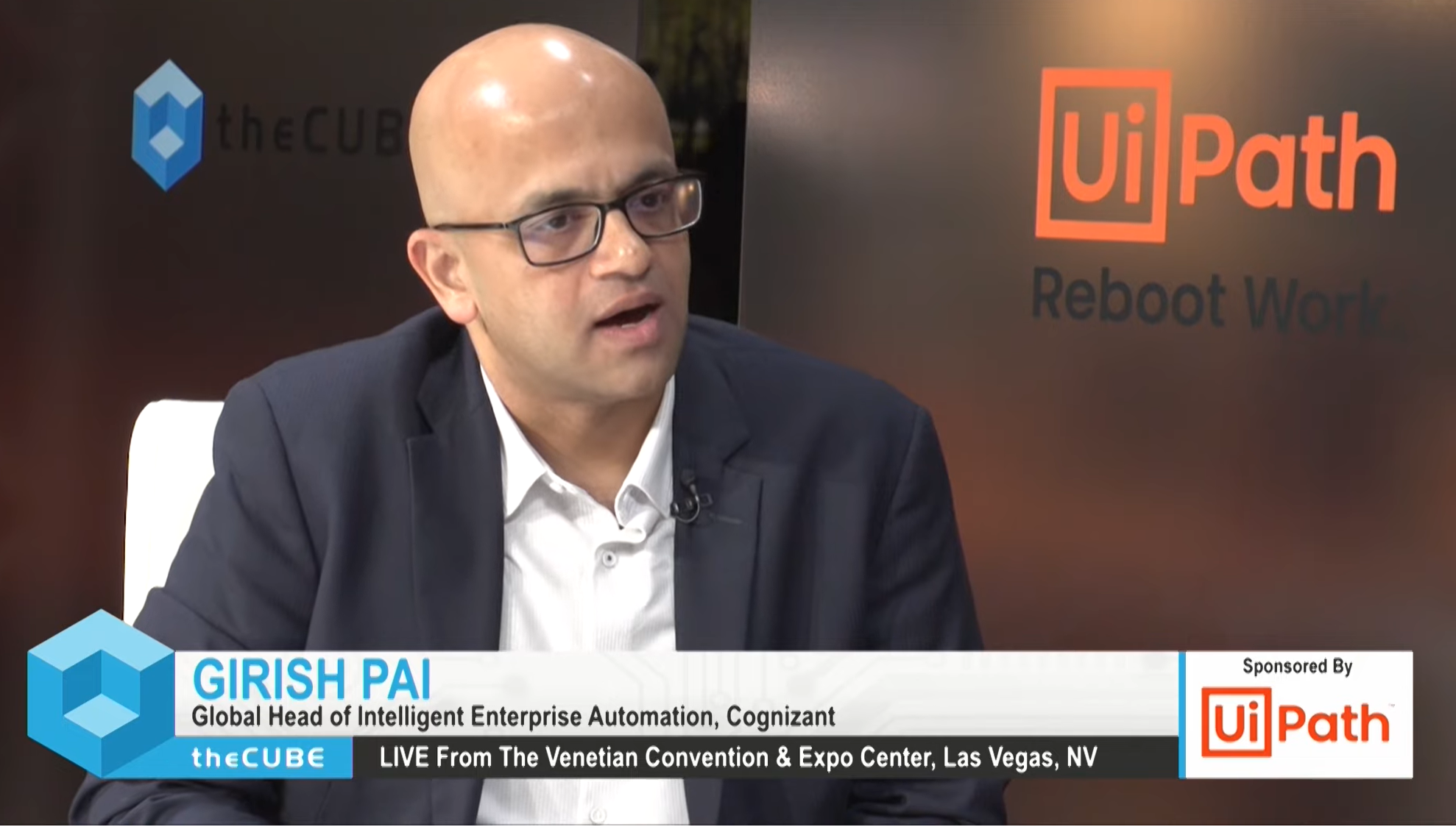Industry:Consulting
Region:Global
Client:Cognizant
Cognizant Creates Automation-Driven Culture with UiPath RPA

7,000
Associates UiPath trained
450,000+
Hours saved
60,000+
Target number of trained employees
Client Overview
Cognizant has over 300K employees worldwide. Their client service teams help companies modernize technology, reimagine processes and transform experiences so they stay ahead in a fast-changing world.
Cognizant has been a long-time UiPath partner, and a customer as well. By empowering their employees with automation development, Cognizant has created an automation-driven culture with aspirations to allow every employee to become a citizen developer.
Cognizant has a deep understanding of the power of automation. Not only have they been a UiPath partner since 2018, but they've also been a UiPath customer. And in 2020, Cognizant expanded their program to roll out citizen-led development. They’ve been training thousands of employees in Robotic Process Automation (RPA) bot development with the goal of teaching them how to harness the power of automation, for Cognizant clients.
Like many organizations, Cognizant has been reviewing digital transformation strategies, including both short-term and long-term planning, with a focus on how automation will be the future of how we work. It's been clear for some time that RPA and intelligent automation must be a central part of the roadmap. The question was how to drive automation within the organization, both to streamline internal processes and to improve both employee experience and customer support.
“Our goal was to enable the organization to have automation at their fingertips,” said Mariesa Coughanour, Head of Automation Advisory & NA Delivery for Cognizant. “We wanted to get these tools into employee’s hands to empower them, enable adoption, and shift the way we work.”
Building a citizen developer training program
The first step was setting up a pilot RPA citizen developer training program. Cognizant started by developing an employee training program drawing from existing lessons learned and best practices acquired from automation work for clients.
Gamification is a big part of employee training, starting with hackathons and a BYOB (bring your own bot) competition with different categories for RPA ideas. The hackathons provided an opportunity to deliver online and virtual training to create their first bots. By doing this they learned early on that they had to incorporate different variations of training depending on how people wanted to and are accustomed to learning. This ensured employees were not only excited but stay engaged. Some work best with online courses, while others prefer virtual training, and others need one-to-one coaching. The initial automations from the hackathon created bots that saved from 10,000 to 20,000 hours. Following this initial success, it was time to scale the program, which led to a reimagined hackathon event named, the “Game of Bots”.
“The result was exponential engagement from employees. Not only was our approach different, but the way we engaged our leaders was unique,” Coughanour said. “Leadership buy in is always key to a program – but our leaders took it even a step further, by engaging with our citizen developers at different stages of the hackathon, and of course being there to distribute the awards. The winning teams even had the opportunity to present their solutions to senior executives, providing additional recognition and personal development. Team members were motivated, and leadership even began sharing what they saw, permeating automation even further into our teams.”

The winning teams even had the opportunity to present their solutions to senior executives, providing additional recognition and personal development. Team members were motivated, and leadership even began sharing what they saw, permeating automation even further into our teams.”
Mariesa Coughanour, Head of Automation Advisory & NA Delivery, Cognizant
Several lessons were learned along the way. First, everyone isn’t starting from the same place as they have different roles within the organization and different knowledge levels around automation. Some individuals wanted to start right away; others wanted to team up, and others wanted to collaborate across groups. Not everyone is at a stage where they were ready or wanted to build, but it was important, everyone felt encouraged to contribute and be a part of the journey. To encourage the trainees, they aligned the awards to drive collaboration, so there were awards for best team, best individual contribution, most opportunities, and so on.
In eight weeks, the "Game of Bots" competition produced automations that saved 200,000 hours -- catapulting the results to over 220K hours in total saved. As of September 2022, Cognizant has saved over 450K hours and more than 7,000 citizen developers are trained in RPA development. The goal is to train and empower more than 60,000 employees. And the Cognizant team is developing training programs to go well beyond basic automation. Cognizant is looking to incorporate intelligent automation training, including optical character recognition (OCR), Process Mining, Task Mining and beyond. Cognizant has also created a new AI fabric to make it easier to use these development tools that will benefit their teams. In addition, they continue to take it further, bringing these offerings and lessons learned from their own experiences back to their clients.
Creating an Automation-Driven Culture
Successful training requires more than teaching automation development skills. To achieve automation-led transformation requires adopting an automation-led mindset where all employees feel encouraged and empowered to be a part of the journey.
Cognizant is seeking to implement a cultural shift to harness the power of automation-led digital transformation. This requires a shift in thinking, asking “why not automate?” and “how can automation improve our processes?” Cognizant gave teams the capabilities to think in broader terms with the UiPath Platform. The art of the possible expands with a complete automation platform from discovery to management. This empowers citizen developers to capture their ideas and guarantees their voices are heard. They created an environment that encourages risk, innovation, and the freedom to try new things.
“This is about creating a culture shift within an organization,” said Coughanour. “We want to digitally enable team members and we want to empower them. We believe everyone can and should have a role in this automation journey — doesn’t mean everyone has to build, but everyone does have a role to play. We want them to feel that the future is happening now. This is something we're leveraging today to drive real results for our organization and our customers.”
In cultivating an automation-driven culture built on a citizen developer program, the Cognizant team came away with some valuable lessons:
Governance—Compliance considerations must be considered, especially for mission-critical and high-risk systems. There need to be some guardrails in place.
Training—Everyone learns differently. Training has to accommodate hands-on experience, classroom-style training, online classes, and other formats, giving trainees a chance to ask questions and collaborate.
Engagement/Gamification—Creating events like a hackathon can exponentially drive engagement and springboard results
Skills profiling—As you add automation, employee roles will change. Working with human resources and a team dedicated to learning development, Cognizant has been working to create new courses and self-directed programs so staff can see where they can grow as part of the team.
Thinking Beyond RPA—Enabling employees includes training them in intelligent automation. As part of self-directed training, employees can showcase their skills in new automation technologies so they can take on new responsibilities.
Capturing results—Empowering employees includes showing them how they are driving value so they can take ownership of their accomplishments. Demonstrating results also inspires senior leaders to want to do more with automation.

With over 3,500 bots already implemented, they have scaled automation across the globe. But they're not focused on how many automations they have in place as the end goal. "It's not about the number, but rather the outcome," said Girish Pai, Global Head of Intelligent Automation, Cognizant. By embracing automation, they are empowering employees to be part of their digital transformation journey. They have given their employees a sense of ownership, and accomplishment, while upskilling the teams along the way.
It's not about the number, but rather the outcome."
Girish Pai, Global Head of Intelligent Automation, Cognizant
Ultimately, they're creating a culture shift. Automation will continue to empower people to work smarter in the future. Giving employees the tools, they need to create new automations is the first step.
Hear more from Girish about how Cognizant has doubled the headcount of citizen developers over the last year and their turn-key automation solutions to help clients achieve their transformation goals.
Related case studies
Ready for your own case study?
Speak to our team of knowledgeable experts and learn how you can benefit from agentic automation.





